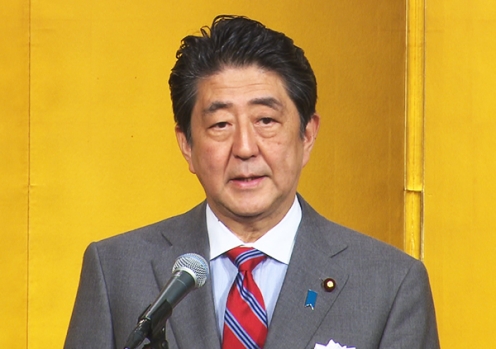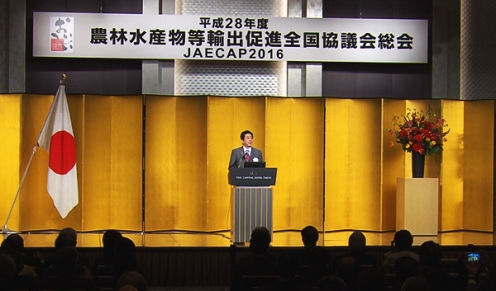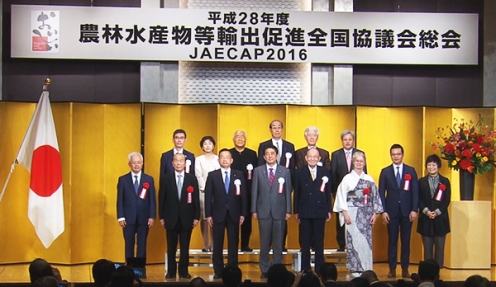Cabinet Secretariat [Wednesday, Nov 30, 2016]
Comment by Prime Minister Shinzo Abe on the Adoption of a Resolution by the United Nations Security Council concerning the Nuclear Test conducted by North Korea and Other Provocations
1. Japan highly appreciates that the United Nations Security Council unanimously adopted Resolution 2321, which remarkably reinforces sanctions on North Korea in response to its conduct of the nuclear test on September 9th and the series of missile launches.
2. North Korea’s nuclear tests and ballistic missile launches are unforgivable outrageous acts and totally unacceptable. The nuclear test conducted in September, along with the repeated ballistic missile launches, has constituted a new level of threat to the entire international community including Japan. In response to this threat of a new level, Resolution 2321 clearly demonstrates the international community’s will to take a resolute response of a new dimension completely different from the past.
3. Japan strongly demands North Korea to sincerely heed the voice expressed by the international community and to comply faithfully and fully with Resolution 2321 and the series of relevant resolutions, without taking further provocations, such as nuclear tests and ballistic missile launches.
4. Japan, as a member of the Security Council, has greatly contributed to the adoption of this resolution in close coordination with concerned countries, including the United States and the Republic of Korea as well as China and Russia. Japan will continue to work closely with concerned countries to strictly implement this Security Council resolution and ensure its effectiveness.
5. This is the first time that a Security Council resolution regarding North Korea expresses its deep concern at the grave hardship that the people in North Korea are subjected to in an operative clause. This demonstrates the strong concern of the international community, including the Security Council, over North Korea’s human rights and humanitarian issues including the abductions.
6. Towards a comprehensive resolution of outstanding issues of concern regarding North Korea, including nuclear and missile issues as well as the abductions issue, which continues to be the most important, Japan will continue to strongly demand North Korea to take concrete actions. With regard to the abductions issue in particular, Japan will make its utmost efforts to realize the return of all abductees at the earliest possible date under its policy of “dialogue and pressure” and “action for action”.
Cabinet Secretariat [Friday, Nov 25, 2016]
Meeting of the Council on Economic and Fiscal Policy
Prime Minister Shinzo Abe held the 19th meeting in 2016 of the Council on Economic and Fiscal Policy at the Prime Minister's Office.
At the meeting, there was discussion related to “the current global financial and economic situation,” “comprehensive economic and fiscal reform: social security reform and the administrative and financial systems of local governments,” and “Basic Principles of FY2017 Budget Formulation.”
Based on the discussion, the Prime Minister said,
“Today, first, we had a discussion on the global financial and economic situation following the presidential election in the United States. I met with President-elect Trump last week, and I was able to have a candid discussion with him. I want for us to build a relationship of trust as we work together.
Second, we had a discussion on social security reform and the reform of the administrative and financial systems of local governments.
First, concerning the price of drugs, the price of Opdivo will be lowered by 50% from as early as February of next year.
During today’s discussion, it was pointed out how important it is that we fundamentally rethink rules regarding drug pricing revision as stated in a proposal from private-sector members, improve transparency, and reflect considerations of cost-effectiveness in evaluations of new drugs.
Building on the proposal from private-sector members, I would like for there to be discussion in this Council toward the fundamental reform of the pharmaceutical price system, and I would like a basic policy on this compiled within the year.
In addition, in order to correct regional disparities in medical costs and care-giving costs, it is vital that we work together as one on this issue while also making clear the division of roles and responsibilities of all relevant parties.
I would like Minister Shiozaki to exercise leadership on this, gather the relevant parties, and accelerate the reform of social security.
Concerning the administrative and financial systems of local governments, the private-sector has offered the opinion that it will be necessary for the national and local governments to work together to promote fiscal soundness in order to achieve the goal of achieving fiscal soundness by FY2020, and that it is vital that regional fiscal measures be advanced in line with the initiatives of the national Government to promote reform. Based on today’s discussion, I want Minister Takaichi to promote reform that enhances the efforts of the regions to the greatest possible extent, including through work to horizontally roll out best practices.
Lastly, we received a report on the basic principles of FY2017 budget formulation. Toward the formulation of the budget for next year, we will advance steady initiatives to achieve fiscal soundness, while also aiming for the creation of a more focused budget, including taking the necessary budgetary measures for important policy issues, such as childrearing and caregiving which will be needed for the realization of a society in which all citizens are dynamically engaged, as well as research and development which are key for Japan’s growth strategy.
I would like all relevant ministers, including Minister Ishihara and Minister Aso, to respond thoroughly to these issues.”
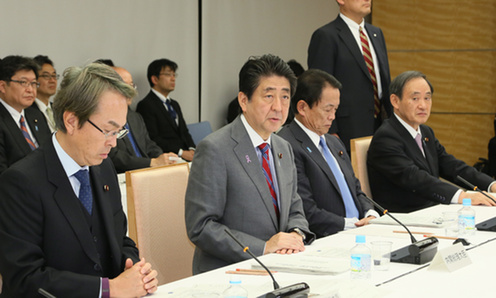
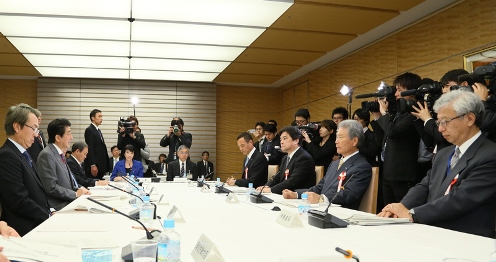
Cabinet Secretariat [Friday, Nov 25, 2016]
The General Assembly of Japan's National Council for Export Promotion of Agricultural, Forestry and Fishery Products and Processed Foods (JAECAP 2016)
Prime Minister Shinzo Abe attended the General Assembly of Japan's National Council for Export Promotion of Agricultural, Forestry and Fishery Products and Processed Foods (JAECAP 2016) held in Tokyo.
The Prime Minister said in his address,
“I would like to offer some congratulatory remarks upon the opening of JAECAP 2016.
To begin, I would like to express my heartfelt congratulations to everyone awarded for their distinguished contributions to the diffusion of Japanese food overseas. Congratulations. All of you have worked wholeheartedly over long periods and have overcome various hardships for the diffusion of Japanese food in places overseas with different food customs. You have my deep respect for the way that you took the lead on the export of Japanese agricultural, forestry and fishery products and foods, and pioneered new markets.
The G7 Ise-Shima Summit was held in May this year. We served food made with Japanese ingredients, as well as Japanese alcohol and wine, to the leaders of each country and everyone who gathered from all over the world for that meeting. Everyone truly enjoyed the food that was served, and I watched intently to see if they would like the wine. Even Chancellor Merkel of Germany and President Hollande of France seemed to relish the wine, going as far as to ask for more when they were done. Seeing that, I felt proud to know that Japanese wine has at last achieved a quality on par with wine from the rest of the world. All the drinks served were extremely well received. I have heard that there has been a rush of orders from both within and outside of Japan for the sake, Hanzo, served for the toast during the working dinner, to the extent that it is now so popular that its makers cannot ship enough of it to keep up with the demand.
There is still room to sell even more of our delicious and safe Japanese products to people overseas. I feel renewed certainty about this.
The export of agricultural, forestry and fishery products and foods is extremely important for our work to turn the agriculture, forestry and fishery industries into growth industries. The Abe Cabinet, myself included, is making efforts to encourage exports, including by taking the opportunities of my trips overseas to communicate directly with leading figures in each country about the charms of Japan’s food culture.
As a result, last year, the value of exports of agricultural, forestry and fishery products and foods out of Japan was approximately 750 billion yen. The Abe Cabinet has set a new record each year for the exports in the area for the past three years in a row.
Global food markets continue to expand, mainly in Asia. We can further grow our exports by actively working to satisfy that demand.
And then there is the Trans-Pacific Partnership (TPP). The TPP presents a tremendous chance to expand exports of Japan’s agricultural, forestry and fishery products.
For that reason, we have moved forward our goal of exporting 1 trillion yen worth of goods annually by one year, and now aim to achieve this by 2019. Toward the achievement of that goal, based on the strategy to strengthen the exports of agricultural, forestry and fishery products established in May of this year, we are working to accelerate ambitious private initiatives that are working to expand exports.
Together with Minister Yamamoto and everyone in attendance today, I hope we can work together to expand exports of our wonderful Japanese agricultural, forestry and fishery products and food even further.
In closing, I would like to conclude my congratulatory remarks by wishing everyone here continued success and good health.”
